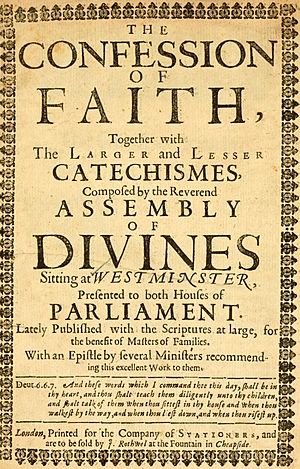Westminster Standards facts for kids
The Westminster Standards is a special name for a group of important documents. These papers were created a long time ago, between 1643 and 1649, by a group called the Westminster Assembly. Think of them as a rulebook and guide for a type of Christian church called Presbyterianism in England and Scotland during the 1600s.
These documents include:
- The Westminster Confession of Faith: This explains what people believed.
- The Westminster Shorter Catechism: A shorter guide, often used for teaching.
- The Westminster Larger Catechism: A longer, more detailed guide.
- The Directory of Public Worship: This explained how church services should be held.
- The Form of Church Government: This described how the church should be organized.
Many Christian churches, especially those in the Reformed tradition and Presbyterian groups, still use parts of the Westminster Standards today. They help guide what these churches believe and how they are run.
Contents
What Are the Westminster Standards?
The Westminster Standards are a collection of religious writings. They were put together by a group of smart and religious leaders. This group, the Westminster Assembly, met in London, England. They worked during a time of big changes and even a civil war in England. Their goal was to create clear rules and beliefs for the church.
Why Were They Created?
The Westminster Assembly was called together in 1643. This was during the English Civil War. Leaders wanted to make the church more organized. They also wanted to make sure everyone had the same beliefs. The documents they wrote helped set out these beliefs and rules. They were very important for the future of Presbyterian churches.
Key Documents in the Standards
The most famous parts of the Standards are the Confession of Faith and the Catechisms.
- The Westminster Confession of Faith is like a detailed summary of Christian beliefs. It covers many topics, from God to how people should live.
- The Shorter Catechism uses questions and answers. It's a simple way to learn important Christian ideas. For example, it asks, "What is the chief end of man?" and answers, "Man's chief end is to glorify God, and to enjoy him forever."
- The Larger Catechism is similar but goes into much more detail. It was for ministers and more advanced students.
The other documents, like the Directory for Public Worship, guided how church services were done. The Form of Church Government explained how churches should be led.
How the Standards Became Popular
After the Church of Scotland approved the Confession and Catechisms in 1648, people started printing them. These collections were called the Westminster Standards. They often included other religious papers too.
Early Printed Editions
In 1658, printers began adding something new. They included the full Bible verses that were mentioned in the documents. This made it easier for people to check the references. These collections became very common. They were used as guides for churches and as religious books for families.
The Standard Collection of 1728
A very important edition came out in 1728. This version became the standard for many years. It was based on an earlier book from 1679. That book was published by a group called the Covenanters. They were Scottish Presbyterians living in Holland at the time. The 1728 collection had 22 different documents. These included laws from the government about the Assembly. It also had other helpful religious writings. Even today, some churches, like the Free Presbyterian Church of Scotland, still print and use this 1728 form of the Standards.
Impact and Legacy
The Westminster Standards had a huge impact. They helped shape the beliefs and practices of many Presbyterian churches around the world. They are still studied and respected today.
Influence on Churches Today
Many Presbyterian and Reformed churches still use the Westminster Confession of Faith and the Catechisms. They see them as important statements of their beliefs. These documents help keep their faith strong and consistent over time. They are a link to the history of these churches.
 | Chris Smalls |
 | Fred Hampton |
 | Ralph Abernathy |


